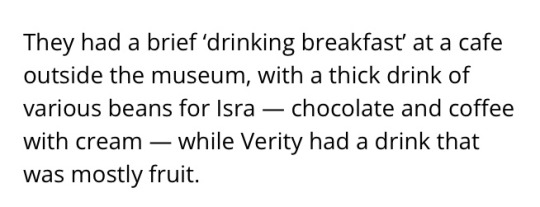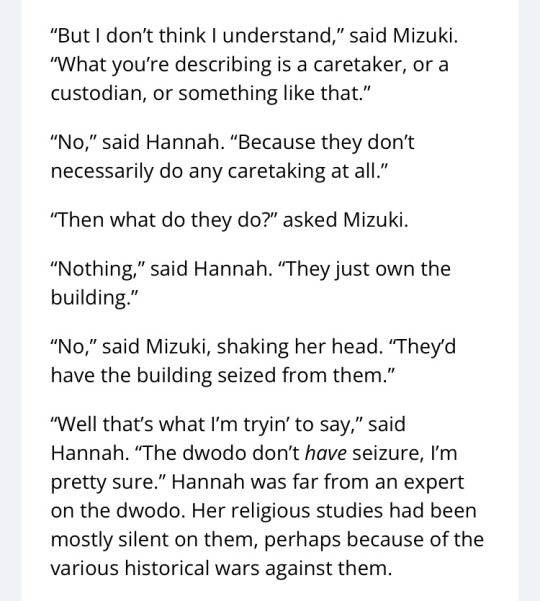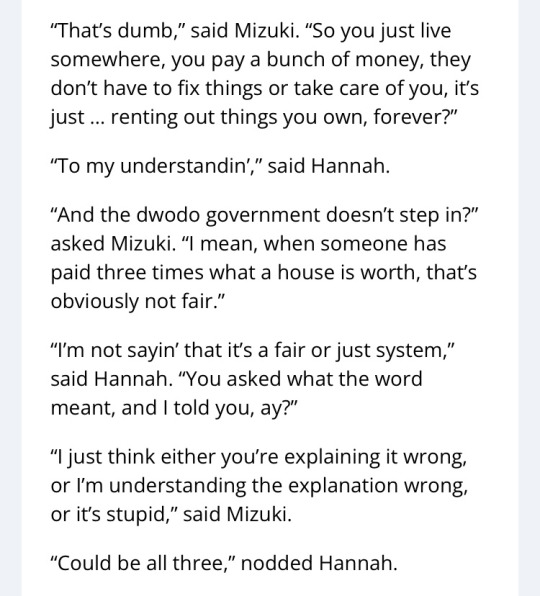#tutbad
Explore tagged Tumblr posts
Text
I finished Dungeon Meshi, after sitting on the last few episodes for too long. Overall I really loved it, but it had been recommended to me for a long time as being similar to This Used to be About Dungeons (which I wrote), and I keep trying to figure out whether these are surface similarities (they both features dungeon adventures, slice of life stuff, certain similarities in the main character) or deeper thematic similarities (found family, a focus on mundanity).
If there's a thematic core to Dungeon Meshi (at least for the first season), it's respecting ecosystems and treating yourself well. If there's a thematic core to This Used to be About Dungeons, it's that young person thing of figuring out who you are.
So to anyone who recommended Meshi to me because of the similarities, thanks, it was great. I just don't find it all that similar, except in some of the more cozy moments, and maybe some of the obsession with with mundanity of domestic life.
29 notes
·
View notes
Text
Lots of fantasy tropes get interpreted very differently in different settings, but I feel like this happens particularly much with the trope of dungeons, because there is no standard explanation for how they work that actually makes sense, so other authors are inspired to come up with their own takes. Some examples from media I've seen (possibly misremembered or misinterpreted):
This Used To Be About Dungeons: dungeons are a distinct magical phenomenon introduced into the world by the Editors (a group of somewhat incompetent litRPG-themed gods), possibly as a way to provide mortals with resources, or dissapate stray magic. If a party of up to 5 people enters one of the entrances spaced in a semi-regular grid throughout the world, a new mini-world (normally a series of rooms) is created until they leave. The monsters do not form a stable ecosystem because they are created ex nihilo along with the rest of the dungeon, and are only aggressive because the Editors made a mistake.
Mother of Learning: mana is generated deep underground, possibly by the heart of the dragon whose petrified body the entire planet is, and seeps up through a series of caves (the dragon's blood vessels). These caves have a higher mana concentration the deeper you go, supporting an ecosystem of increasingly dangerous and magical monsters, but also causing the formation of valuable crystallised mana deposits.
Worth the Candle: The Exclusionary Principle: kind of similar to TUTBAD (and by the same author), one of the many types of magic that exist in the setting is a spell whose effect is to create a dungeon. The caster can customise it to some extent, but it inevitably ends up with some mixture of danger and treasure.
Dungeon Meshi: I'm less sure I'm interpreting this one right, but as I understand it, there are two basic sources of energy for life: sunlight and mana. Sunlight of course is only available above ground, and mana can be created by living things in a self-sustaining loop, but also tends to drift away into the air if not contained, so this self-sustaining loop only works in enclosed spaces. There are therefore two distinct classes of ecosystems, sunlight-based ecosystems above ground, and mana-based ecosystems underground, whether that's in natural caves or artificially excavated areas.
Beer and Beards: kind of similar to Mother of Learning, areas where magic is naturally generated, but with a particular elemental flavour of magic in each location, so there are distinct dungeons each with unique properties. The one nearest where the story takes place has plant magic, and is therefore good for crops.
I'd be interested to hear if you know of more interesting takes from other media.
37 notes
·
View notes
Text

Love when fantasy authors do this, makes me laugh every time
3 notes
·
View notes
Text
Such Mizuki energy
every time i see a teenager one to three years younger than me i become a fagged out socialite
18K notes
·
View notes
Text
Just calmly, slowly, go buy the book, and no one gets trapped in metafictional hell.
-Alexander Wales
Listen to me Wales metafictional hell is my kind of place and I will thank you not to besmirch its good name.
I would totally read a hundred thousand words of the TUTBAD crew reviewing WtC, and polish it off with a MICatWoA/Erogamer/OFtMG crossover.
#Alexander Wales#Worth the Candle#This Used To Be About Dungeons#So help me I will write a fic#Do I need to write a fic?
5 notes
·
View notes
Text
My wife has finally started reading This Used to be About Dungeons. She's about halfway into the first book and has stopped only once to read out a description of a cat, which is very on brand for her.
12 notes
·
View notes
Text
I was like “yeah the tutbad chapters are short I’m not tearing through it that fast I guess” but it’s almost 800k words lol
2 notes
·
View notes
Text
Oh this is great, it makes me think of the magic user's limit being not exhausting a resource but reaching the point where they've channeled so much otherworldly power that it starts to permanently warp their bodies. Monstergarden has wizards for whom bodily change is an inevitable consequence of doing magic but I also like the thought that magic is available to anyone but that it takes training and skill to manage the side effects inflicted on the body and mind.
Cryomancer trying to sap the heat from an incoming lava flow? Now their body temperature won't go over 30 degrees. Floramancer growing a tree in seconds to support a crumbling castle? Their entire right arm turned to wood. Scryer needed to find the one universe out of ten million where they'd survive? They're going to be seeing echoes of alternate universes for the rest of their life.
There's a notion that I think is decently popular, of the mortal <> divine spectrum, where moving towards the divine end of the spectrum allows you more power but less freedom. As a bog-standard mortal, you shape your own identity, laze away your days in a drunken stupor, or build a cabin in the woods and be accountable to no one. As Teshub the Storm God, you can command the winds, throw lightning, and lay waste to armies with a torrent of hail. Each is not available to the other.
This echoes Cultist Simulator a bit: as you get closer to transcending your mortality, you may no longer need to sustain your physical body, but now you have other requirements: maybe you need to maintain a level of spiritual purity, you have new urges that need to be satisfied, or you've entered into an endless struggle with other immortals. As your power grows, your agency wanes, and the more you master your domain the stronger you fetter yourself to it. Perhaps a being of ultimate power loses their agency altogether, as they become synonymous with the fundamental laws of the universe.
I really like the combination of these two concepts, which ends up being sort of the reverse of the clerics in TUTBAD: magic lets you do things otherwise impossible but if you fail to control it, it changes you according to its own principles. This is a path for amateur casters to be transformed into monstrous elementals or for the greatest mages to ascend to godhood, but it can have consequences at every level in between, with both physical and mental alterations common to certain domains of magic. It's even more interesting when especially skilled mages can hide the fact that they know magic entirely, by virtue of having none of the tells that characterize mages of less skill! Food for thought.
I loveee fantasy settings doing magical exhaustion:
burnt out pyromancers emitting steam and smoke
tired cryomancers shivering with visible foggy breath
weary necromancers looking ill and hearing voices
frazzled healers receiving the same cuts, bruises, and injuries of their patients
24K notes
·
View notes
Text
gotta say it’s astonishing to me how deeply cutting some of the relationship/etc stuff in tutbad is. feels personal at this point. mr wales you don’t know me how did you reach into my head like this to roast me so bad
literally reading every perspective in these chapters (except for alfric i guess) is making me do the

#I can hear you saying ‘maybe you should try being more well adjusted. or learning from resolutions in the text’ and that’s great advice but#consider that I am …. not good at life#tutbad#this used to be about dungeons
2 notes
·
View notes
Text
reading This Used to be About Dungeons and saying gleefully to myself “they lesbianing together (:”
2 notes
·
View notes
Text
GET IT MIZUKI!!!
0 notes
Note
TutbaD is well done slice of life, with the dungeon delves providing momentum.
I quite like it, but I don't know who to recommend it to.
Also, Mizuki's POV stresses me out, because of the whole 'social aggression as primary problem solving' she's got going on.
Did you ever start This used to be about Dungeons, it's finished now.
no i havent! i like what alexander wales writes, i liked worth the candle A LOT, but i wasnt hooked by the pitch of this used to be about diungeons.
i was aware of its ending because im in the alexander wales discord server, i am also aware that he is currently writing another story called thresholder, which also didnt hook me
2 notes
·
View notes
Text


haha yeah alexander wales said FUCK landlords
0 notes
Text
well shit I’m caught up on tutbad… guess I’ll add yet another web serial to my rotation
1 note
·
View note
Text
the trending tiktok audio, how different characters would ask if you’re gay, tutbad party edition
You’re gay. : Alfric
You’re gay! : Verity
You’re one o’ them queers? : Mizuki
You’re girlypop: Hannah
HHMNNH: Isra
#the audience for this post is like. two people in the entire world. but to me and that other person…….it hits#this used to be about dungeons
3 notes
·
View notes
Text
I regret to inform you that I’ve started reading Thresholder (aka Alexander Wales sexism regression… he was being so good about it in tutbad 🫥)
What if I started Yet Another web serial
5 notes
·
View notes